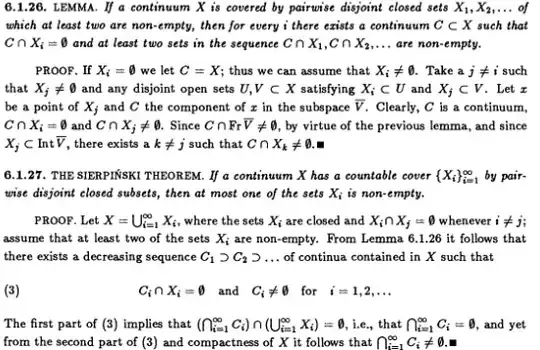My friend threw me a challenge. He told me that he proved the follow proposition:
The topological space $[0,1]$ cannot be partitioned into pairwise disjoint nondegenerate closed intervals (except the trivial partition $\{ [0,1] \}$).
I think that it's false because I prove the follow proposition:
It's impossible to cover $[0,1]$ with pairwise disjoint closed intervals with a finite number of singletons (except for $\{ [0,1] \}$).
Proof?
Let be $0<a_1<a_2<1$, I have that $$[0,1]=[0,a_1] \cup [a_2,1] \cup \left]a_1,a_2\right[.$$
Now I have one "hole" to cover with closed interval.
$\left]a_1,a_2\right[=[a_1+r_1,a_2-r_2] \cup \left]a_1,a_1+r_1\right[ \cup \left]a_2-r_2,a_2\right[$ with $r_1,r_2>0$ such that these are disjoint.
Now I have two "holes" to cover $\left]a_1,a_3\right[$ and $\left]a_4,a_2\right[$ where $a_3=a_1+r_1$ and $a_4=a_2-r_2$.
Following in this way I obtain that $$[0,1]= \bigcup_{i=1}^{\infty}[a_i,a_{i+1}] \cup Z$$ where $Z$ is a countable infinite family of separated "holes". It's impossible to use a finite number of singletons to cover a infinite number of separated holes. $\Box$
What do you think about my proof? Who is right?
